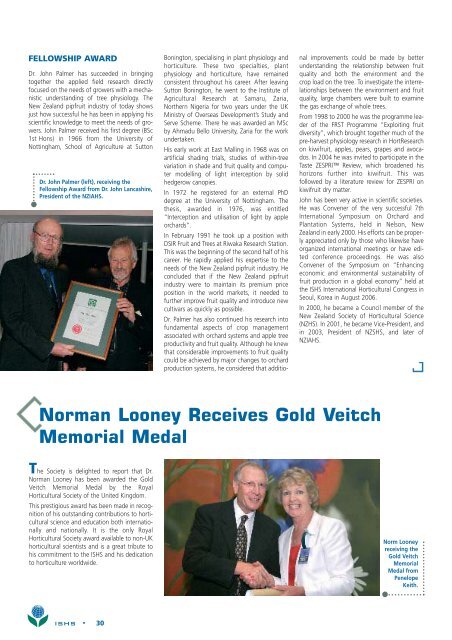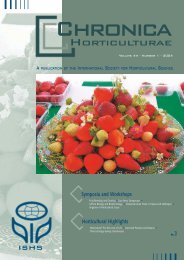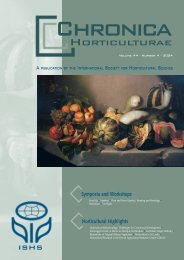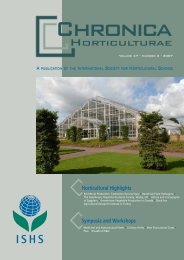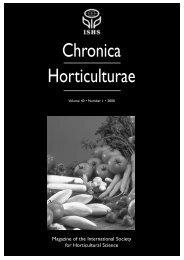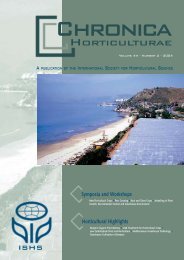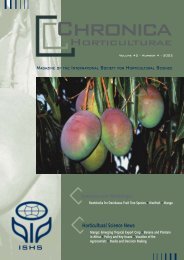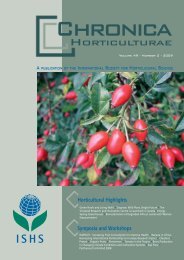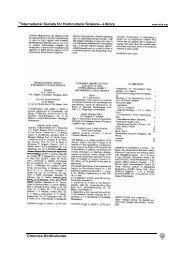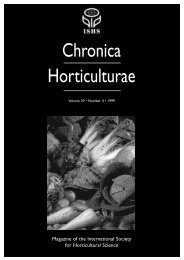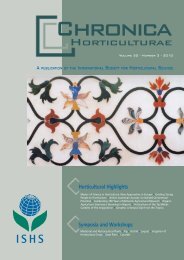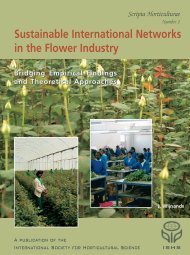Chronica - Acta Horticulturae
Chronica - Acta Horticulturae
Chronica - Acta Horticulturae
You also want an ePaper? Increase the reach of your titles
YUMPU automatically turns print PDFs into web optimized ePapers that Google loves.
FELLOWSHIP AWARD<br />
Dr. John Palmer has succeeded in bringing<br />
together the applied field research directly<br />
focused on the needs of growers with a mechanistic<br />
understanding of tree physiology. The<br />
New Zealand pipfruit industry of today shows<br />
just how successful he has been in applying his<br />
scientific knowledge to meet the needs of growers.<br />
John Palmer received his first degree (BSc<br />
1st Hons) in 1966 from the University of<br />
Nottingham, School of Agriculture at Sutton<br />
Dr. John Palmer (left), receiving the<br />
Fellowship Award from Dr. John Lancashire,<br />
President of the NZIAHS.<br />
Bonington, specialising in plant physiology and<br />
horticulture. These two specialties, plant<br />
physiology and horticulture, have remained<br />
consistent throughout his career. After leaving<br />
Sutton Bonington, he went to the Institute of<br />
Agricultural Research at Samaru, Zaria,<br />
Northern Nigeria for two years under the UK<br />
Ministry of Overseas Development’s Study and<br />
Serve Scheme. There he was awarded an MSc<br />
by Ahmadu Bello University, Zaria for the work<br />
undertaken.<br />
His early work at East Malling in 1968 was on<br />
artificial shading trials, studies of within-tree<br />
variation in shade and fruit quality and computer<br />
modelling of light interception by solid<br />
hedgerow canopies.<br />
In 1972 he registered for an external PhD<br />
degree at the University of Nottingham. The<br />
thesis, awarded in 1976, was entitled<br />
“Interception and utilisation of light by apple<br />
orchards”.<br />
In February 1991 he took up a position with<br />
DSIR Fruit and Trees at Riwaka Research Station.<br />
This was the beginning of the second half of his<br />
career. He rapidly applied his expertise to the<br />
needs of the New Zealand pipfruit industry. He<br />
concluded that if the New Zealand pipfruit<br />
industry were to maintain its premium price<br />
position in the world markets, it needed to<br />
further improve fruit quality and introduce new<br />
cultivars as quickly as possible.<br />
Dr. Palmer has also continued his research into<br />
fundamental aspects of crop management<br />
associated with orchard systems and apple tree<br />
productivity and fruit quality. Although he knew<br />
that considerable improvements to fruit quality<br />
could be achieved by major changes to orchard<br />
production systems, he considered that additional<br />
improvements could be made by better<br />
understanding the relationship between fruit<br />
quality and both the environment and the<br />
crop load on the tree. To investigate the interrelationships<br />
between the environment and fruit<br />
quality, large chambers were built to examine<br />
the gas exchange of whole trees.<br />
From 1998 to 2000 he was the programme leader<br />
of the FRST Programme “Exploiting fruit<br />
diversity”, which brought together much of the<br />
pre-harvest physiology research in HortResearch<br />
on kiwifruit, apples, pears, grapes and avocados.<br />
In 2004 he was invited to participate in the<br />
Taste ZESPRI Review, which broadened his<br />
horizons further into kiwifruit. This was<br />
followed by a literature review for ZESPRI on<br />
kiwifruit dry matter.<br />
John has been very active in scientific societies.<br />
He was Convener of the very successful 7th<br />
International Symposium on Orchard and<br />
Plantation Systems, held in Nelson, New<br />
Zealand in early 2000. His efforts can be properly<br />
appreciated only by those who likewise have<br />
organized international meetings or have edited<br />
conference proceedings. He was also<br />
Convener of the Symposium on “Enhancing<br />
economic and environmental sustainability of<br />
fruit production in a global economy” held at<br />
the ISHS International Horticultural Congress in<br />
Seoul, Korea in August 2006.<br />
In 2000, he became a Council member of the<br />
New Zealand Society of Horticultural Science<br />
(NZHS). In 2001, he became Vice-President, and<br />
in 2003, President of NZSHS, and later of<br />
NZIAHS.<br />
Norman Looney Receives Gold Veitch<br />
Memorial Medal<br />
The Society is delighted to report that Dr.<br />
Norman Looney has been awarded the Gold<br />
Veitch Memorial Medal by the Royal<br />
Horticultural Society of the United Kingdom.<br />
This prestigious award has been made in recognition<br />
of his outstanding contributions to horticultural<br />
science and education both internationally<br />
and nationally. It is the only Royal<br />
Horticultural Society award available to non-UK<br />
horticultural scientists and is a great tribute to<br />
his commitment to the ISHS and his dedication<br />
to horticulture worldwide.<br />
Norm Looney<br />
receiving the<br />
Gold Veitch<br />
Memorial<br />
Medal from<br />
Penelope<br />
Keith.<br />
ISHS • 30


